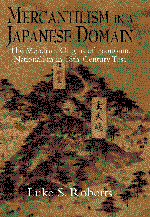Book contents
- Frontmatter
- Contents
- List of maps, tables, and figures
- Acknowledgments
- Dates and units of measurement used in the text
- Maps
- 1 Introduction
- 2 The geography and politics of seventeenth-century Tosa
- 3 Creating a crisis in Tosa, 1680–1787
- 4 The decline and restoration of domain finances
- 5 Voices of dissatisfaction and change: The petition box
- 6 Imagined economies: Merchants and samurai
- 7 Declining service
- 8 Cooking up a country: Sugar, eggs, and gunpowder, 1759–1868
- 9 Conclusion
- Glossary of terms and manuscript document titles used in the text
- Sources for figures and tables
- Works and documents cited
- Index
2 - The geography and politics of seventeenth-century Tosa
Published online by Cambridge University Press: 17 September 2009
- Frontmatter
- Contents
- List of maps, tables, and figures
- Acknowledgments
- Dates and units of measurement used in the text
- Maps
- 1 Introduction
- 2 The geography and politics of seventeenth-century Tosa
- 3 Creating a crisis in Tosa, 1680–1787
- 4 The decline and restoration of domain finances
- 5 Voices of dissatisfaction and change: The petition box
- 6 Imagined economies: Merchants and samurai
- 7 Declining service
- 8 Cooking up a country: Sugar, eggs, and gunpowder, 1759–1868
- 9 Conclusion
- Glossary of terms and manuscript document titles used in the text
- Sources for figures and tables
- Works and documents cited
- Index
Summary
When all of the lords [of Ieyasu's camp] were gathered Katsutoyo announced, ‘We should set our horses toward Kamigata. … The reason Ieyasu is pausing is because he worries about the dangers of the road there. If that is the case, I will open my castle of Kakegawa to him and hand it over to one of his trusted retainers, and I will give him a hostage as dear to me as myself. …’ Then twelve or thirteen of the lords signed together [a document that they would do likewise]. … On the way out, Ieyasu grabbed Katsutoyo's sleeve and said, with tears in his eyes, ‘I owe everything to you this time’.
Recollections of Yamauchi Katsutoyo's page, Tanikawa ShichizaemonSamurai were at the heart of the early modern political order, and their vision of human relations dominated the political structure and the economy. They were warriors whose success depended on faithful service to the right lord. Yamauchi Katsutoyo received the domain of Tosa in 1600 for his service to Ieyasu at the battle of Sekigahara. This realm made Katsutoyo wealthy, yet it was a domain and a wealth that he had to be ready at any moment to devote to his overlord's command. Katsutoyo demanded no less from his retainers, whom he enfeoffed, and not much less from leading merchants and peasants, who were required to help Katsutoyo and his descendants serve.
- Type
- Chapter
- Information
- Mercantilism in a Japanese DomainThe Merchant Origins of Economic Nationalism in 18th-Century Tosa, pp. 32 - 55Publisher: Cambridge University PressPrint publication year: 1998



